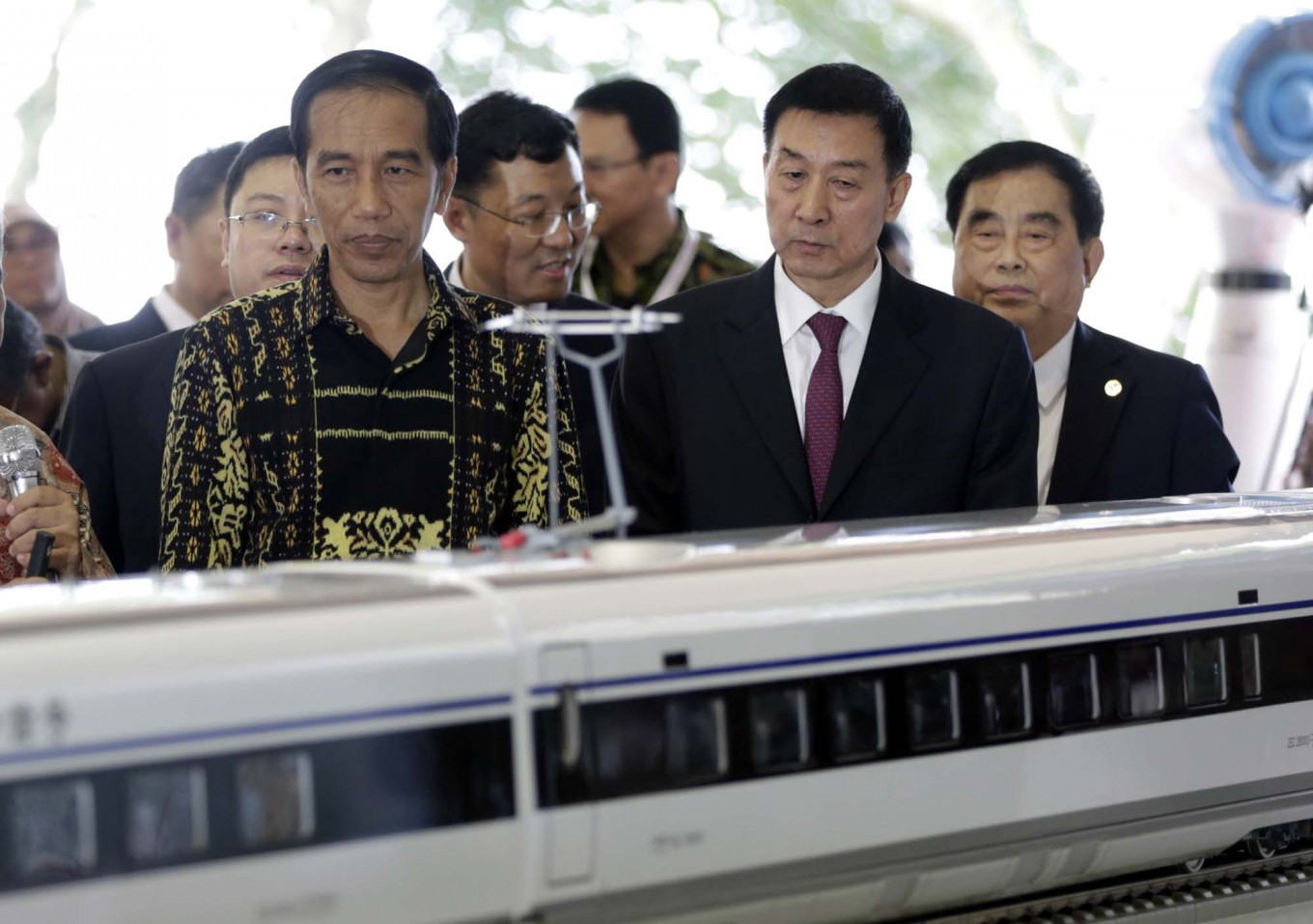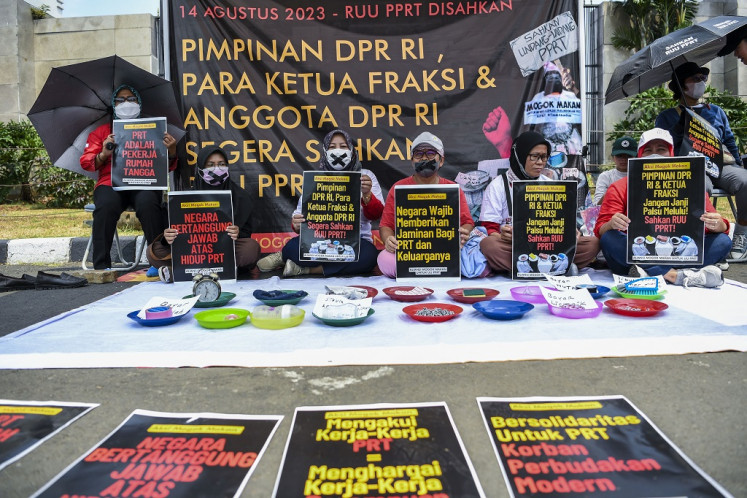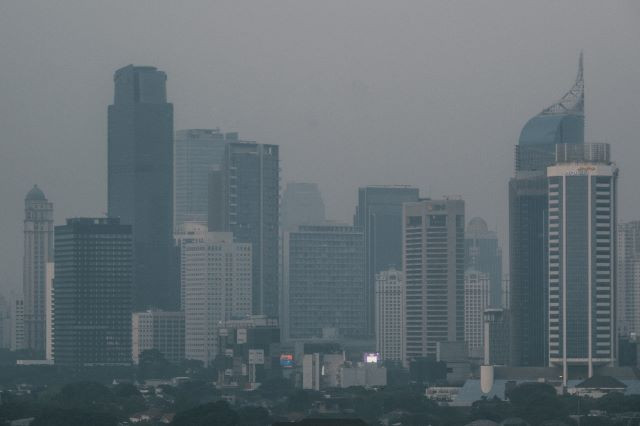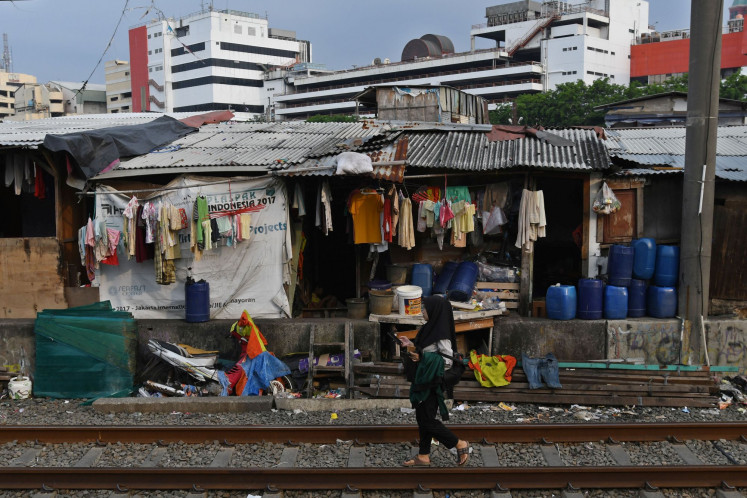Popular Reads
Top Results
Can't find what you're looking for?
View all search resultsPopular Reads
Top Results
Can't find what you're looking for?
View all search resultsMore than just economy: Maritime implications of China's investment
China capitalizes on this noninterference by building bilateral relationships with individual ASEAN countries - leaving its expansion policies largely uncontested by ASEAN neighbors.As a result, the “China Threat” involves the expectation of reciprocation in the political sphere that China demands of its economic recipients. The low level of mutual political trust and fear of Chinese hegemony is in fact secondary to the quiet realization that the “high speed” diplomacy has unwritten obligations.
Change text size
Gift Premium Articles
to Anyone
 Indonesian president Joko Widodo, left, inspects a model of the high-speed train which will connect the capital city of Jakarta to the country's fourth largest city, Bandung, with President of China Railway Corp. Sheng Guangzu, right, Chinese State Councillor Wang Yong, second right, and Chinese Ambassador to Indonesia Xie Feng, third right, during the groundbreaking ceremony for the construction of its railway in Cikalong Wetan, West Java, Indonesia, Thursday, Jan. 21, 2016. (AP Photo/Dita Alangkara)
Indonesian president Joko Widodo, left, inspects a model of the high-speed train which will connect the capital city of Jakarta to the country's fourth largest city, Bandung, with President of China Railway Corp. Sheng Guangzu, right, Chinese State Councillor Wang Yong, second right, and Chinese Ambassador to Indonesia Xie Feng, third right, during the groundbreaking ceremony for the construction of its railway in Cikalong Wetan, West Java, Indonesia, Thursday, Jan. 21, 2016. (AP Photo/Dita Alangkara)
I
n light of the recent increase in Chinese presence in Natuna waters, critics and scholars alike have called on the Indonesian government to break its silence and assert its own legally-backed claims over Indonesia’s exclusive economic zone (EEZ).
While China considers the Natuna Islands to be part of its “traditional fishing grounds”, Indonesia holds legal sovereignty based on the 1982 UN Convention on the Law of the Sea (UNCLOS). However, neither side have stated specific territorial claims, leading some to wonder what imperatives have kept Indonesia from taking a firmer stance on the issue.
This event marks Indonesia’s entry into the South China Sea debate, almost a decade after the territorial fiasco between China, Vietnam, Malaysia, and the Philippines began. And just as the country remained silent on the Spratly Islands dispute, so too has Indonesia taken a “non-claimant” stance on the Natuna issue. Researcher Evan Laksmana described Indonesia’s position as akin to a “hollow neutrality” -- one that China echoes with great ambiguity, and one that has only recently been questioned.
Indeed, this event comes as a striking change in direction for China-Indonesia relations, largely due to how Indonesia remained (much to China’s favor) “neutral” during the SCS debacle, in addition to the recent groundbreaking of a China-financed Indonesian high-speed rail (HSR) project. It thus seems curiously contradictory that China acts as both a benevolent neighbor and a regional superpower - assisting Indonesia’s development while simultaneously threatening its territorial sovereignty.
This analysis proposes that China’s economic assertiveness and Indonesia’s supposed neutrality regarding the SCS are somewhat interlinked, and that future Indonesian policy should be viewed under this consideration.
Chinese economic investment in Indonesia
China’s “One Belt One Road” initiative positioned Indonesia as the largest Southeast Asian recipient of China’s foreign infrastructure investment, amounting to about $87 billion in repayable loans. Rather controversially beating Japan, China recently won the contract to build Indonesia’s first HSR project between Jakarta and Bandung, investing $5.5 billion without requiring a guarantee from the Indonesian government.
According to Xie Feng, the Chinese ambassador to Indonesia, the HSR project represents a “major breakthrough in international capacity and equipment cooperation” between the two nations - a landmark agreement representing the win-win nature of China’s ambitious “One Belt One Road” initiative.
But for China, investing in foreign infrastructure projects is not so much a politicized tactic as it is an economic necessity. The nation’s railway industry has reached a critical economic juncture: China’s own railway networks are already highly developed, and its production surpluses create an imperative to expand its customer base to countries like Indonesia. This perhaps explains the strong economic ties China has built with several ASEAN nations.
This is not to say that China’s economic assistance is entirely apolitical in nature. Critics claim that China’s recent investments in infrastructure are mere diplomatic attempts to ease tensions between ASEAN member states.
Others see it as an attempt to find a line of influence - an opening in the Southeast Asian region. After all, a central hallmark of Chinese foreign policy is reciprocity, and it seems that China will only testify to its “good neighborhood” approach so long as its territorial claims in the SCS remain uncontested.
Diplomatically speaking, China emphasizes a “common destiny” approach of coercive connectivity that opposes the ASEAN norm of mutual noninterference. China capitalizes on this noninterference by building bilateral relationships with individual ASEAN countries - leaving its expansion policies largely uncontested by ASEAN neighbors.
As a result, the “China Threat” involves the expectation of reciprocation in the political sphere that China demands of its economic recipients. The low level of mutual political trust and fear of Chinese hegemony is in fact secondary to the quiet realization that the “high speed” diplomacy has unwritten obligations.
The litmus test: So far so good?
Wilmar Salim and Siwage Negara from the Institute of Southeast Asian Studies, posit that China’s investment in Indonesian infrastructure can be seen as an economic “litmus test”. But the litmus test goes beyond economic viability; the HSR project is also a litmus test for the structural legacy of what Chinese infrastructural investments leave behind.
In particular, the proposition of building a “common destiny” leaves neither intellectual expertise nor local manufacturing facilities, reflecting what Hong Yu of the USC US-China Institute describes as China’s competitive, rather than complementary, relationship with its ASEAN counterparts.
The politicized premise behind China’s foreign economic investments is thus not as altruistic as it seems, and the inherent danger is in assessing the “win-win” results of the “One Belt One Road” initiative solely by its economic outcomes.
The fallacy is in using the HSR project itself as a litmus test - and thereby a source of justification - to assess the political soundness of China’s influence on Indonesia. After all, wouldn’t such a fallacy likewise justify and encourage Indonesia to maintain its indifference toward the SCS debate?
The question of Indonesia’s silence lies beyond China exerting its political prowess under the guise of economic benevolence. Instead, Indonesia should be more concerned with its supposed neutrality regarding the China-Indonesia HSR project, as well as the illusory perception that the HSR project is mutually exclusive from the SCS fiasco.
This is not to say that Indonesia should be wholly condemned for its silence; the debate on territorial sovereignty remains integral, but the antithesis to that indifference is far from the solution. In order for Indonesia to find its compromise, critics must first acknowledge the reasons behind the government’s current silence.
Much like how the Jakarta’s High Speed Rail project is far from being politically neutral, so too is Indonesia’s supposedly “neutral” response tainted with color.
***
Julius Utama is a student in New York University's Department of Applied Psychology, with research concentrations in Sociology and Communications. Michelle Kim is an International Relations and Chinese double major at Emory University. The writers are currently conducting research on China-Indonesia relations as interns at the Centre for Strategic and International Studies (CSIS) in Jakarta.
---------------
We are looking for information, opinions, and in-depth analysis from experts or scholars in a variety of fields. We choose articles based on facts or opinions about general news, as well as quality analysis and commentary about Indonesia or international events. Send your piece to community@jakpost.com.









